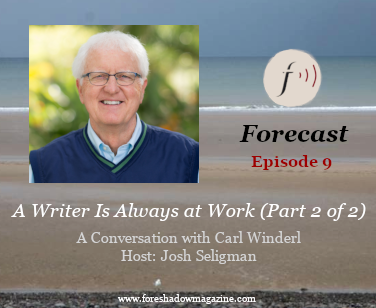|
After clicking 'Play', please wait a few moments for the podcast to load. You can also listen on Spotify, Apple, Google, Podomatic, Player FM and Deezer. Listen to other Forecasts here. Poet and writing teacher Carl Winderl shares one of his newest poems and the relationship between his faith and writing. Then Josh gives a brief update on the emerging identity of Foreshadow. This is the second part of two episodes, the first of which you can find here. Host: Josh Seligman Link to Carl's book: The Gospel According . . . to Mary (Finishing Line Press, 2021) Below are excerpts from today's Forecast about Carl's faith and work. This transcript has been lightly edited for clarity and concision. Seeing literally and figuratively The poet begins with the basic premise that he's going to see things literally and figuratively. When I would teach poetry classes, on the very first day of the class, I would let students know that I can teach you how to write poetry, but I cannot teach you to be a poet. There's a big difference there. In the follow-up, I would say, if you're going to be a poet, that's up to you. You've either got it in you, or you're going to figure out a way to make it happen. When I would see students writing or read other poets, I would understand that they are able to take something that is literal and see it figuratively as well. That's what the power of a simile or a metaphor is. It says something is like something else, or it says something is something else. 'Someone is as swift as a deer' is a simile...It's an engagement that's inviting the listener or reader to make those leaps. I think that's what makes poetry somewhat difficult to understand. The poet expects them to 'Hey, take a leap with me.' We all know what it means to smell literally, but what about smelling figuratively? [In my poem,] what Mary implies is that the original smell from Lazarus' tomb is repulsive, it's repugnant, it's offensive. But when Jesus arises, the scent is beautiful. All of the frankincense and myrrh and cassia and aloe. I'm a poet, and I love this. Those are the same ointments that they put on his body when he was a baby. People will say to me, 'What's your favourite book?' And I say, 'It's the Bible'. They say, 'Oh no, you have to say that because you taught at a Christian university'. I'm like, 'No. That's the way it is because there's so much flashbacking and foreshadowing.'...How can you not love the Bible when you see things like that? St Augustine said, 'The New Testament is concealed in the Old Testament, but the Old Testament is revealed in the New Testament.' And it's this concealing/revealing that helps me understand and makes me look for these opportunities. That's how my faith is strengthened. For me, faith is intellectual. It's a rational thing. I can decide to follow Christ because I believe in what he says and what he's done and what he does. My faith is an intellectual exercise. When I see things like this, when I see these overlaps, when I see the foreshadowing and the flashbacking, when I see that Abraham and Isaac and the sacrifice there foreshadows what God is going to do with his Son Jesus, and that we have the same notion that he's the Lamb of God, we have the same notion that Abraham saves Isaac's life because he sees another sheep in the thicket and he sacrifices it instead of his son, that kind of juxtaposition makes me go, 'How can I not want to read the book, how can I not want to believe these stories?' I think part of what I've tried to do is to help people see that kind of insight as well. Maybe that's what The Gospel According . . . to Mary is all about, helping people to see the things that I see, and to see them literally and figuratively. Like in this poem, how something smelling so bad can end up smelling so good. And you know what? That's Jesus. That's God. He does that with all of our lives. He takes what we are and makes something beautiful out of what we can be, could be, should be. Carl Winderl holds a Ph.D. in Creative Writing from New York University and maintains a home in San Diego, California.
Carl's other work on Foreshadow: At Judas' funeral (Poetry, March 2021) A Writer Is Always at Work (Part 1 of 2) (Interview, May 2021) Josh Seligman is the editor of Foreshadow. You can read his update on Foreshadow's emerging identity here.
0 Comments
Leave a Reply. |
Categories
All
ForecastSupport UsArchives
July 2024
|

 RSS Feed
RSS Feed
